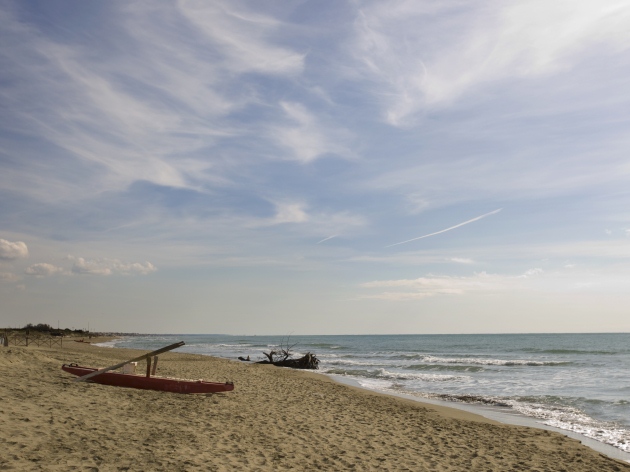
The Presidential Estate of Castelporziano covers an area of about 59 square kilometers (5,892 hectares) and is 24 kilometers from the center of Rome. It extends to the coast and is bounded by Via Cristoforo Colombo, the Pontine State Road and by the Ardeatina, the Coastal Road that from Ostia leads to Anzio.
The Estate has most of the Mediterranean environment typical ecosystems: proceeding from the sea towards the hinterland, there is a large area of pristine beach, recent sandy dunes with pioneer and colonizing plants, ancient dunes consolidated with wetland areas and low and high areas of Mediterranean scrub, with green and aromatic species.
For the most part, the forest is plain and characterized by oak trees. The different varieties of oaks – Oak Bark, Quercus Frainetto, Turkey Oak, Holm Oak, Cork Oak - are joined by other species, Poplars, Ash Trees, Alders, Maples and Hornbeams, distributed according to their microclimatic and nutritional requirements.
The undergrowth is particularly rich in the typical shrubs of the maquis: Juniper, Myrtle, Lentisk, Heather, Cistus, Arbutus, Broom, Laurel, Phillyrea, Smilace, just to name some. Recent research have identified 1082 botanical species.
The Umbrella Pine, although of artificial introduction, is now a fundamental element of the landscape and provides a consistent production of pine nuts.
The woods alternate with clearings and natural grasslands, home to centuries-old trees. Of particular interest, also from the landscape point of view, are the so-called Swimming Pools, natural pools of water that testify to the ancient presence of damp environments and flooded woods that extended up to the Pontine plain.
The great variety of vegetation corresponds to a similar wealth of fauna species. There is a large population of wild boar and fallow deer, together with families of roe deer and more modest groups of deers. Other mammals are also of significant biological value: the hare, the mustelids - martens, weasels, badgers -, foxes, porcupines, hedgehogs.
The environment of the Estate also offers an excellent refuge for various species of birds, both resident and migratory. Among the permanent residents, peaks of various species, the Jay, the daytime birds (the Buzzard is very common) and nocturnal birds like the Owl, the Tawny Owl and the Barn Owl.
Among the migratory birds, as well as numerous waders, anatids and limicides, all attracted by the wetlands, are the dove, the pigeon, the oriole, the woodcock and the rare black kite.
Domestic animals constitute a significant component of the ecosystem and the landscape. The Estate, in fact, ensures the permanence in purity of horses and cattles of Maremma breed, bred in the wild and cared for by expert cowboys (Butteri), according to a centuries-old tradition. The selection is assiduously taken care of, so much so that the specimens of Castelporziano are often ranked first in the main exhibitions and trade shows.
The Presidential Estate of Castelporziano, born as a hunting reserve and farm, has progressively lost these specific destinations: in 1977 hunting activity was forbidden and the crops, historically aimed at ensuring revenue, are today considered as an integral part of the environment and landscape typical of the Roman countryside.
The guiding criteria are those of minimizing the impact, and today the 500 hectares reserved for non-intensive crops only ensure the production of cereals and fodder, partly used for livestock farming. The experimental orchard and vegetable garden, of organic cultivation, are small but of considerable interest.
The environmental value of the Presidential Estate of Castelporziano, an area with a high level of biodiversity and the only true green lung in a densely populated and urbanized area, has taken on such importance that over the last few years measures to safeguard and protect it have gradually intensified.
Of particular importance was the annexation, in 1985, of the area of Capocotta (about 1,000 hectares), saved by building speculation. In this perspective is also the Presidential Decree n. 136/N of May 5, 1999, according to which the Estate is subject to a regime of protection in conformity with criteria that refer to the provisions relating to protected natural areas.
On the basis of this Decree, Castelporziano has been recognized as a State Natural Reserve. The legislation provides, among other things, for the establishment of a Commission, of which eminent personalities from the academic and scientific world have been called to participate with the task of formulating indications and proposals aimed at guaranteeing a correct and balanced management of the area.
Informationen
Reservations
> Naturalistic route of Malpasso
> Archaeological route Tor Paterno
> Historical and artistic route
To book a visit to the estate
Call center, tel. 06 39967557
from Monday to Sunday 9.00 to 19.00
Infopoint Information and booking center
Salita di Montecavallo 15/A, near Piazza del Quirinale
Open on Palace opening days, from 9.00 to 17.00 starting October 1, 2021
For schools tel. 06 51098316, tenuta@quirinale.it
Further details on the page dedicated to visits: > Booking for schools
 Condividi
Condividi
Locations
Um mehr über alle barrierefreien Dienste zu erfahren, besuchen Sie den Abschnitt barrierefreies Rom.












































